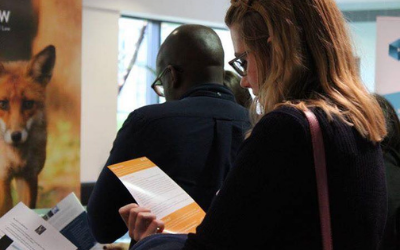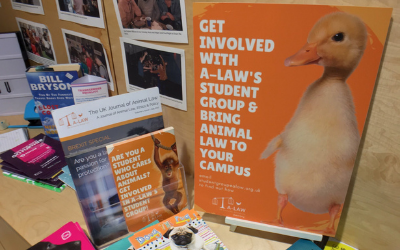General Information
General information about your rights and responsibilities towards animals, including where to find more detailed guidance. Please note, we are not a law firm and cannot provide legal advice about specific cases.
More information! General responsibilities towards animals…
Whilst the information on this page has been carefully prepared, it does not constitute legal advice and should not be used or relied upon and you should not act or refrain from acting, upon the information contained within this website.
A-LAW, its trustees, volunteers and agents do not accept or assume any responsibility or duty of care in respect of any use of or reliance upon this information. Accordingly A-LAW does not accept any liability for any loss arising from any action taken or not by any person in reliance on this information or any part of it.

Legal responsibilities towards animals in your care
The Animal Welfare Act 2006 places a duty of care on people in England and Wales to take reasonable steps to meet the welfare needs of their animals. In Scotland, the equivalent legislation is the Animal Health and Welfare (Scotland) Act 2006 and in Northern Ireland it is the Welfare of Animals Act (Northern Ireland) 2011.
The Government, through the Department of Environment, Food and Rural Affairs (Defra) publishes Codes of Practice relating to the welfare needs of specific breeds, such as cats, dogs, horses and non-human primates. For England and Wales, this guidance can be found on the RSPCA website here.
The Codes of Practice and other useful information about animal welfare in Northern Ireland can be found on the website of the Department of Agriculture, Environment and Rural Affairs for Northern Ireland here. The Codes of Practice for Scotland can be found here. Further useful information about a person’s legal duty to care for animals can be found on the RSPCA’s website here.

Wildlife Crime
The responsibility for enforcement of the laws protecting wildlife lies with the police service and if you suspect a wildlife crime you can report this either to your local police or to the RSPCA, using the helpline numbers above. In London, the Wildlife Crime Unit of the Metropolitan Police can be contacted. See further information on their website here.
There is very helpful information about the law protecting wildlife on the RSPCA website here. Where the issue relates to interference with wild birds, you can also contact the RSPB here.
Information about humane control of pigeons is available from the Pigeon Control Resource Centre (PCRC), an online resource for issues relating to pigeon control. The information on the site is geared towards solving pigeon control problems by the use of humane and non-lethal control methods. Click here for more information.
The Department of Environment, Food and Rural Affairs (DEFRA) also publishes advisory leaflets and their specialist wildlife advisors are available to discuss specific problems. DEFRA’s website is here.

Animal Laws outside of the UK
Where your concern relates to an animal welfare issue outside the UK, you may find it helpful to contact an animal welfare organisation in the relevant country. Cases of suspected cruelty may be addressed to the country’s embassy in the UK for forwarding to relevant local authorities.
Avoid contributing to global wildlife problems. Wildlife crime is a major problem and when travelling abroad it is important to be aware of restrictions on the importation of animals and animal products to avoid unwittingly breaking the law. Also, be aware of the impact that your actions may have on local wildlife, as behind many so-called tourist activities with animals, there lies a catalogue of animal suffering. You can discover more from Save the Asian Elephant (S.T.A.E)
The Born Free Foundation and the Captive Animals Protection Society both welcome information from the public about the animal welfare issues in zoos and circuses, whether in the UK or elsewhere in the world.

Concerns about suspected cruelty to animals
In England and Wales, the RSPCA investigates potential wrongdoing and also brings prosecutions, although the RSPCA has proposed handing over it’s prosecutorial role to the Crown Prosecution Service. In Scotland, the SSPCA investigates cases and reports potential offences to the Crown Office and Procurator Fiscal (COPFS), who will bring any criminal proceedings on behalf of the Crown. In Northern Ireland the Welfare of Animals Act (Northern Ireland) 2011 is enforced by Department of Agriculture and Rural Development inspectors (farmed animals), Council inspectors (other animals, such as domestic pets and horses), and PSNI constables.
You can call the RSPCA’s cruelty line on 0300 1234 999. The SSPCA’s number is 03000 999 999. Lines are often very busy, so please bear in mind that these organisations are charities and have limited resources. You may also visit the RSPCA’s website here, which contains useful information, including a cruelty checklist that can be used before reporting suspected cruelty.
If you require immediate assistance – for example, if you see animal cruelty in progress, or a dog that is suffering in a hot car – the best option will usually be to contact the police. In most areas of the UK, you can contact the local police by dialing 111 (or, in an emergency, 999). Although the RSPCA do investigate and prosecute cases of suspected animal abuse or neglect, the police do have a legal responsibility for investigating offences against animals and should not insist that you contact the RSPCA if you are concerned that a crime is being committed. You can also provide information about suspected serious crimes anonymously to Crime stoppers on 0800 555 111.

Pet shops, breeding & boarding establishments, zoos and stray animals
Pet shops, dog breeding and boarding establishments, and zoos are all licensed and inspected by local authorities. If you have a complaint about such an establishment, it is appropriate to contact the environmental health department of the district or borough council for the relevant area.
Local authorities are also responsible for dealing with stray dogs. They employ animal wardens who can intervene to ensure that animals are being cared for properly. They can also take action where pet animals are being used or allowed to cause a danger or a nuisance to other people or animals.

Veterinary Standards
If you are concerned about poor veterinary practice you should raise it with the veterinary practice directly. If you are unhappy with the response and there are professional conduct issues you can bring these to the attention of the Royal College of Veterinary Surgeons (RCVS). This is the best way of trying to ensure that lessons are learnt for the benefit of animal welfare. There is also a vet mediation service which is free to members of the public with complaints about vet services: https://www.vetmediation.co.uk/.
If you are contemplating bringing a civil claim for negligence, it is important that legal advice is sought from a specialist in this area of law. Details may be obtained from the Law Society of England and Wales here and the Law Society of Scotland here.






